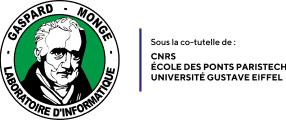First part: Registration of Heterogeneous Data for Urban Modeling
Indoor/Outdoor modeling of buildings is an important issue in the field of building life cycle management. It is seen as a joint process where the two aspects collaborate to take advantage of their semantic and geometric complementary. This global approach will allow a more complete, correct, precise and coherent reconstruction of the buildings. Addressing this hard problem requires combining:
• Terrestrial indoor and outdoor and aerial acquisitions in order to capture the inside, outside, and roof of the building.
• LiDAR and image in order to have the geometric precision of the LiDAR with the rich texture information from the images.
The first issue of such modeling is thus to precisely register such heterogeneous data. The work carried out has confirmed that the environment and the type of data drive the choice of the registration algorithm. As in a building environment, most objects are composed of geometric primitives (planar polygons, straight lines, and openings), so we chose to introduce registration algorithms based on these primitives. The basic idea of these algorithms consists of the definition of global energy between the extracted primitives from the data sets to register and the proposal of a robust method for optimizing this energy based on the RANSAC paradigm. The proposed solutions have exceeded the limitations of existing algorithms and have proven their effectiveness in solving the challenging problems encountered by this kind of modeling such as the indoor (static mode)/outdoor (dynamic mode) registration, image/LiDAR data registration, and aerial/terrestrial registration.
Second Part: From BIM To Digital Twin: Towards New Challenges In Construction
For this part of the presentation, we will focus on the presentation of the BIM2TWIN project and our main contribution as partners of the project. BIM2TWIN project aims to build a Digital Building Twin (DBT) platform that provides full situational awareness for construction management by implementing lean principles to reduce operational waste of all kinds, shorten schedules, reduce carbon footprint and costs, and enhance quality and safety. It supports a closed loop Plan-Do-Check-Act mode of construction and an extensive set of construction management applications. Our work focuses on the progress monitoring and quality
control using volumetric building data. For this end, we need first to detect the constructed objects and then check if they are constructed up to norms (quality control) and on time (progress monitoring). Detecting objects during the construction cycle is difficult due to certain challenges: noise, missing data and local shift. In this talk, we will introduce a potential solution for object detection that can deal with most of the challenges encountered in construction sites.
Bio
Rahima Djahel obtained a master’s degree in automatic image and language processing from the University of Caen Normandy in 2016. During her master’s training, she did two internships:
The first at the GREYC laboratory of ENSICAEN, where she worked on 3D Point Cloud Processing and Analysis
The second was at the MIPS laboratory of the University of Haute Alsace, where she worked on Images registration from several views of the same object in 3D microscopy.
After that, she worked as a study engineer in 3D reconstruction of microscopic objects as part of the Interreg France-Switzerland CITHaDel project at FEMTO-ST Institute. In January 2019 she started a PhD thesis at the Ecole des Ponts ParisTech where she worked under the supervision of prof. Pascal Monasse and Dr Bruno Vallet on the registration of heterogeneous data for urban modeling. She defended her thesis in June 2022. During her PhD thesis, she proposed potential solutions for challenging problems in building modeling:
indoor/outdoor registration, Image/LiDAR registration, aerial/terrestrial registration. She obtained two awards: The ISPRS award of best young author (for her first published paper 2021) and the ISPRS award of best poster (for her second published paper 2022).
Currently, she is a postdoctoral researcher at INRIA Université Côte d’Azur. She works as part of the European BIM2TWIN project (Optimal Construction Management & Production Control). Her work focuses on the progress monitoring and quality control using volumetric building data. For this work she concentrates more on object detection in construction sites, where she proposed, in collaboration with Kacper Pluta and Pierre Alliez, a potential solution which can deal with the most encountered challenges in construction sites. This algorithm will be submitted soon.
She is interested in digital twin, robotics and point cloud processing.
Localisation
Amphithéâtre 110 (ESIEE Paris)
